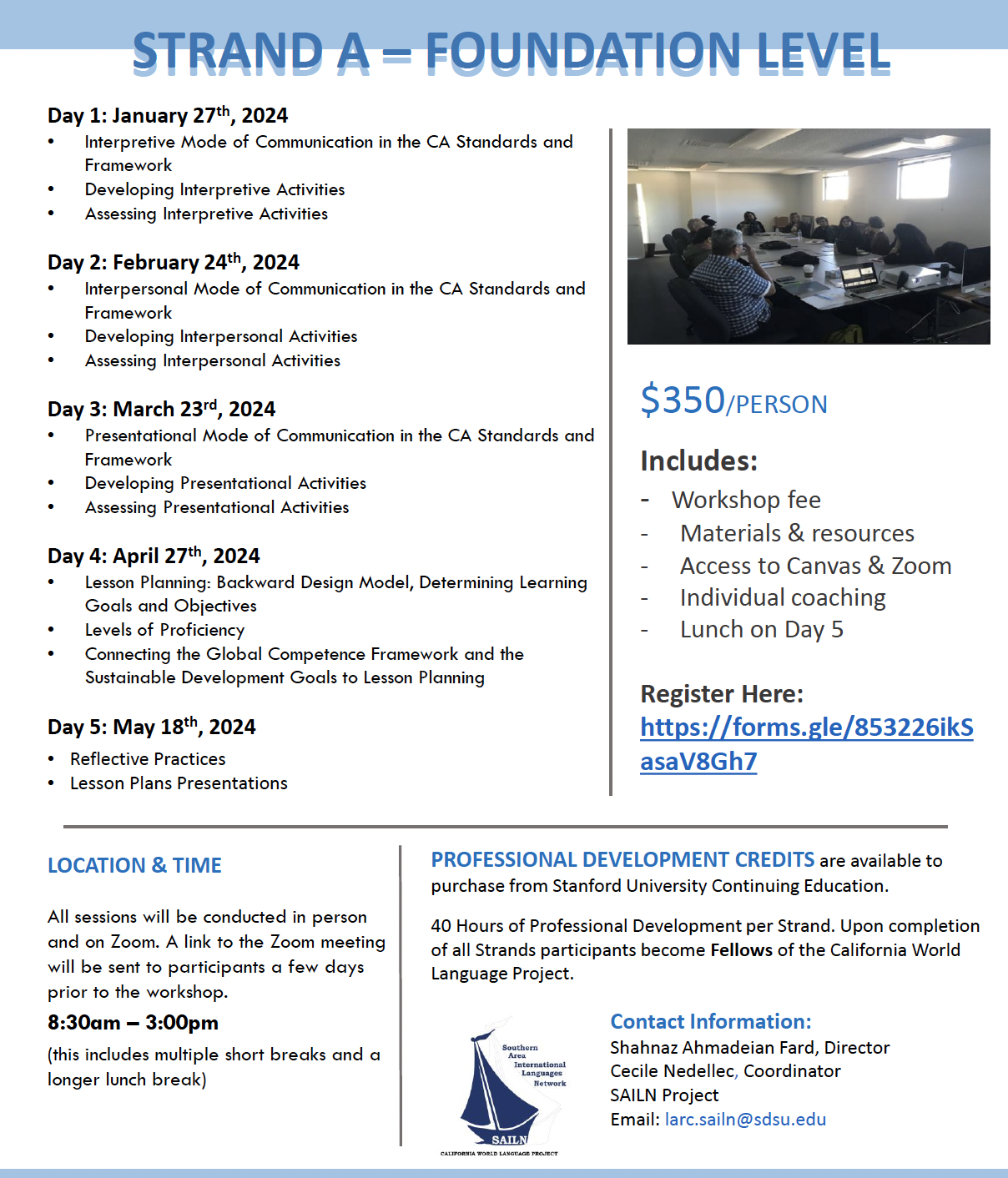Please scroll down to view the event descriptions, presenters, and registration link.
Strand B
- Dates: June 10, June 11, June 12, June 13, and September 14
- Time: From 8:30 am to 3:30 pm
- Format: Hyflex (in person and on Zoom)
- Location for in person: SDSU-LARC
- Presenters: Mariana Apalategui, Robin Newsom-Wuertz, and Evan Rubin
Participants will explore strategies and activities to plan a reading unit for flexible learning environments (Face-2-Face, Hybrid and/or Fully online). Participants will receive support in developing a reading unit around the new California World Languages Standards and Framework, the principles of Universal Design for Learning, and the integration of technology, which will guide the development of the participants' reading unit. Participants will be able to implement Can Do Statements, to use backward lesson planning strategies, selecting authentic resources, to integrate technology into lessons, and how to create formative and summative assessment for their reading unit.
Strand C
- Dates: June 10, June 11, June 12, June 13, and September 14
- Time: From 8:30 am to 3:30 pm
- Format: Hyflex (in person and on Zoom)
- Location for in person: SDSU-LARC
- Presenters: Dr. Nadezda Novakovic and Dr. Cecile Nedellec
Strand C focuses on the effective classroom assessment of world language learners. Participants will review the basic assessment concepts and the concept of backward design through the lens of the new California World Languages Standards and Framework. Participants will learn how to search for, select, and use authentic materials to create cognitively engaging and age- and culturally- appropriate learning activities at all proficiency levels for each mode of communication. They will also learn how to integrate interpretive, interpersonal, and presentational tasks to create meaningful summative assessments of the students’ ability to use the target language in real-world settings and how to integrate standard-based grading in their curriculum.
Workshop for Spanish Teachers
- Date: Saturday, May 18, 2024
- Time: 9:00 am to 12:15 pm
- Location: Hyflex (at SDSU-LARC in person or on Zoom)
- Presenters: Ingrid De Alba and Dana Ali
- Registration link: https://forms.gle/roEU537JqJVoPsnw5
 Hola! My name is Dana Ali. I have been a Dual Immersion teacher for the past 9 years within CVESD. I currently teach 6th grade Science and Spanish at Discovery Charter School. I've also taught 7th grade and 3rd grade. My alma mater for both my undergraduate and graduate degrees is San Diego State University. My master's degree heavily focused on EdTech which I utilize a lot in 6th grade to enhance my lessons and prepare my students for the future ahead. I also hold a BCLAD and a GATE certification from UCSD. In addition, I provide professional development in the Chula Vista Elementary School District as a Bilingual Resource Teacher. Lastly, I am an evaluator for the California Department for Teacher Credentialing. As for myself, I embrace and celebrate diversity and biliteracy as l come from a multicultural and multilingual background myself being of Palestinian and Colombian descent. I am excited to be part of the SAILN and LARC team and hope to make a lasting positive impact on language education.
Hola! My name is Dana Ali. I have been a Dual Immersion teacher for the past 9 years within CVESD. I currently teach 6th grade Science and Spanish at Discovery Charter School. I've also taught 7th grade and 3rd grade. My alma mater for both my undergraduate and graduate degrees is San Diego State University. My master's degree heavily focused on EdTech which I utilize a lot in 6th grade to enhance my lessons and prepare my students for the future ahead. I also hold a BCLAD and a GATE certification from UCSD. In addition, I provide professional development in the Chula Vista Elementary School District as a Bilingual Resource Teacher. Lastly, I am an evaluator for the California Department for Teacher Credentialing. As for myself, I embrace and celebrate diversity and biliteracy as l come from a multicultural and multilingual background myself being of Palestinian and Colombian descent. I am excited to be part of the SAILN and LARC team and hope to make a lasting positive impact on language education.
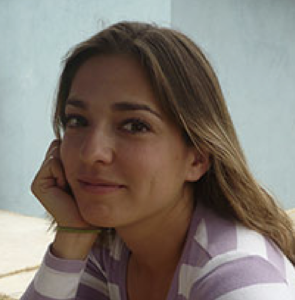
Ingrid De Alba: A language educator since 2000, has a rich and diverse career that spans continents. She dedicated a decade to teaching English in Mexico City, followed by three years in Spain, where she continued to refine her pedagogical skills. In Southern California, she has spent the last nine years taking on various roles in education. Before becoming a language teacher, Ingrid worked as an interpreter and translator at the United States Embassy in Mexico City, laying the groundwork for her future endeavors. Her commitment to staying at the forefront of educational practices is reflected in her master's degree in Educational Technologies, enabling her to seamlessly integrate technology into her teaching methodologies. Ingrid is currently a Spanish and Integrated Math 1 for the Fallbrook School District, helping Spanish speaking students reach their potential in areas like math and science.
Russian, Persian, and Arabic Workshops on Zoom
- Date: Saturday May 18th, 2024
- Location: on Zoom
- Time: click on the link below to see the time of the workshops
- Registration link: https://forms.gle/roEU537JqJVoPsnw5
Abstract: "This presentation focuses on the integration of song as a key tool in the learning process of Russian language and culture. I will provide various models and materials suitable for diverse contexts, including beginning and intermediate classrooms with heritage learners, as well as advanced and mixed-level classrooms. The benefits of incorporating songs into the Russian language classroom are numerous, ranging from vocabulary expansion and improved listening skills to fostering communication and enhancing intercultural competence. I will demonstrate how the use of songs enriches the learning experience, making it more engaging and effective. Participants will not only gain practical models but also an understanding of how to integrate songs into their lessons to stimulate students and enhance their success in learning the Russian language and culture."
Presenter’s information:
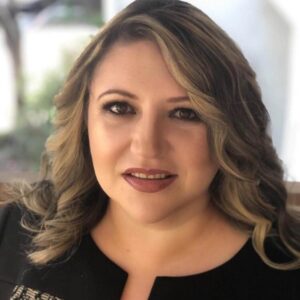 Anna Asadov-Ossowska, originally from Siberia, Russia, grew up bilingual in Russian and Polish. After relocating to Poland, she pursued dual degrees in International Business and Russian language from San Diego State University. As an ESL Instructor at Pacific Southwest Community Development Corporation, she taught English to low-income residents. At San Diego Russian School, she taught Russian history and cinematography. Since 2019, Anna has been teaching intensive Russian courses and leading Advanced Russian Immersion classes at SDSU LARC, integrating cooking sessions to connect students with Russian culture. She's enrolled in various professional development programs like AATSEEL and Stanford STARTALK, focusing on diverse and inclusive teaching methods. Her dedication to continuous learning enhances her ability to provide high-quality instruction to her students.
Anna Asadov-Ossowska, originally from Siberia, Russia, grew up bilingual in Russian and Polish. After relocating to Poland, she pursued dual degrees in International Business and Russian language from San Diego State University. As an ESL Instructor at Pacific Southwest Community Development Corporation, she taught English to low-income residents. At San Diego Russian School, she taught Russian history and cinematography. Since 2019, Anna has been teaching intensive Russian courses and leading Advanced Russian Immersion classes at SDSU LARC, integrating cooking sessions to connect students with Russian culture. She's enrolled in various professional development programs like AATSEEL and Stanford STARTALK, focusing on diverse and inclusive teaching methods. Her dedication to continuous learning enhances her ability to provide high-quality instruction to her students.
10:45 am to 11:30 am - Hajar
Topic of discussion: The Impact of Engaging Activities and Grouping Strategies on Student Participation and Motivation in Target Language Classrooms
Abstract:This presentation will highlight the importance of creating and leading student engagement in order to obtain effective learning outcomes within the context of a 21st-century education system.
It will showcase the effectiveness of interactive activities and tasks, practiced within the classroom, to help enhance student engagement and motivation, in regards to world language acquisition. Additionally, there will be a demonstration on such interactive activities and strategic student groupings, that ultimately contribute to a more positive learning environment.
These activities can be adapted by Persian language instructors across different grades and language proficiency levels in the classroom.
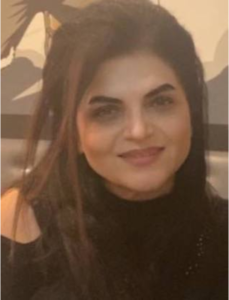 Presenter’s information: Hajar, born and raised in Iran by the Caspian sea, 28 years later, finds herself navigating the Pacific ocean. She is a passionate Persian (Farsi) instructor and believes in a growth mindset approach, giving everyone the equal opportunity to learn in their authentic way. Her dual education (MA, San Diego State & BA, Univ. of Alzahra) allows for engaging lessons for a diverse group of learners.
Presenter’s information: Hajar, born and raised in Iran by the Caspian sea, 28 years later, finds herself navigating the Pacific ocean. She is a passionate Persian (Farsi) instructor and believes in a growth mindset approach, giving everyone the equal opportunity to learn in their authentic way. Her dual education (MA, San Diego State & BA, Univ. of Alzahra) allows for engaging lessons for a diverse group of learners.
Working with the SDSU-LARC team since 2016 as a Persian curriculum developer and instructor in different programs, Hajar is dedicated to fostering a lively and interactive language learning atmosphere. Currently she is one of the Persian instructors for the STARTALK programs since 2021. She strives to make materials engaging and relevant to students by modifying them as needed. She places great value on her role in promoting linguistic growth among both heritage and non-heritage language learners.
Beyond university teaching, she also contributes to the Iranian School of San Diego, teaching advanced-level Farsi to the heritage language learners since 2012.
11:30 am to 12:15 pm - Forouzesh
Abstract: This five-session unit focuses on “City Life” communication skills for Persian learners with a performance range of Novice High/Intermediate Low and an approximate duration of 120 minutes per session. Here, I explore important topics such as giving and receiving directions, city sites, understanding diverse types of transportation, youths’ daily life activity in a city in the target language and the teen's ideal city. Navigating the practical language associated with getting around in Persian-speaking environments using present tense or present continuous tense. Learners will practice the language in different task-based activities.
Learners will be able to:
-Giving and receiving directions
-Ask and respond to questions about the destination
-Talking about places in a town, where they would like to go to visit, and how they get there.
-Describe, understand, and compare their daily activity to others.
-Create a model of an ideal city using their knowledge.
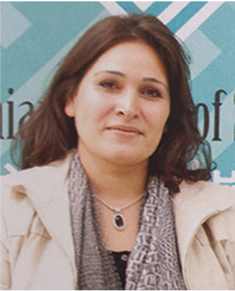 Presenter’s information: Forousezh has a degree in Mathematics and has experience in implementing world language pedagogy. Also she is a fellow of the California World Language Project (CWLP) and she is ACTFL trained. She has been the Persian Language Group Leader at the STARTALK Teacher training programs at LARC since 2013 and Persian Mentor during STARTALK Persian Focus Teacher Training 2021 LARC-SDSU. As the group leader, she assisted the Persian Language Group participants with developing thematic lesson plans that include activities in the target language. She is the Persian Instructor at the STARTALK Persian Summer Camps offered by LARC since 2010 and since 2021 with Hybrid Persian STARTALK Students Program (pre-summer and post-summer sessions) and in person at San Diego State University campus (summer camp). She is currently teaching Persian to different group ages at the Iranian School of San Diego. She was recognized as the “Teacher of the Year” by the San Diego Iranian School in 2015. Forouzesh is one of the authors of a published Persian workbook that is being used by most Persian schools around the United States.
Presenter’s information: Forousezh has a degree in Mathematics and has experience in implementing world language pedagogy. Also she is a fellow of the California World Language Project (CWLP) and she is ACTFL trained. She has been the Persian Language Group Leader at the STARTALK Teacher training programs at LARC since 2013 and Persian Mentor during STARTALK Persian Focus Teacher Training 2021 LARC-SDSU. As the group leader, she assisted the Persian Language Group participants with developing thematic lesson plans that include activities in the target language. She is the Persian Instructor at the STARTALK Persian Summer Camps offered by LARC since 2010 and since 2021 with Hybrid Persian STARTALK Students Program (pre-summer and post-summer sessions) and in person at San Diego State University campus (summer camp). She is currently teaching Persian to different group ages at the Iranian School of San Diego. She was recognized as the “Teacher of the Year” by the San Diego Iranian School in 2015. Forouzesh is one of the authors of a published Persian workbook that is being used by most Persian schools around the United States.
12:30pm to 1:30 pm - Ghassan
Abstract:
Social Aspects of Language Learning:
Understanding Context and Culture
By the end of this workshop, participants will be able:
1- To understand the relationship between language and culture.
2- To appreciate the importance of culture and context in language learning, and how they help with effective communication.
3- To demonstrate the power of Linguistic Landscapes and Film in developing Intercultural Competence.
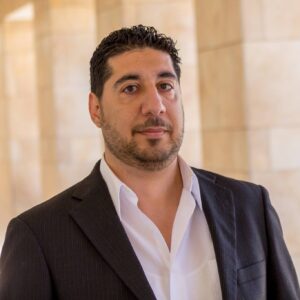 Presenter’s information: Ghassan Zakaria has been in the education field since 2004. He holds a Master’s degree in Applied Linguistics from San Diego State University (SDSU). Also, he has The Advanced Certificate of Teaching English as a Second Language (TESOL) from SDSU. For the past 20 years, Ghassan has worked at the Department of Linguistics & Asian/Middle Eastern Languages at San Diego State University, as well as its Language Acquisition Resource Center (LARC), Grossmont- Cuyamaca college and The National University. His teaching portfolio includes Elementary Arabic I and II, Intermediate Arabic I and II, Advanced Arabic I and II, Conversational Arabic, Online Conversational Arabic, Distinguished Level Arabic for highly proficient students, Arabic Culture and Arabic Civilization, Arabic for Native Speakers, and Levantine dialect courses. In 2013, the College of Arts and Letters (CAL) at SDSU recognized me as the Faculty of the Year. In 2023, Ghassan received the Excellence in Teaching award from (CAL) and the Most Influential Faculty Member award from The College of Professional Studies and Fine Arts at SDSU.
Presenter’s information: Ghassan Zakaria has been in the education field since 2004. He holds a Master’s degree in Applied Linguistics from San Diego State University (SDSU). Also, he has The Advanced Certificate of Teaching English as a Second Language (TESOL) from SDSU. For the past 20 years, Ghassan has worked at the Department of Linguistics & Asian/Middle Eastern Languages at San Diego State University, as well as its Language Acquisition Resource Center (LARC), Grossmont- Cuyamaca college and The National University. His teaching portfolio includes Elementary Arabic I and II, Intermediate Arabic I and II, Advanced Arabic I and II, Conversational Arabic, Online Conversational Arabic, Distinguished Level Arabic for highly proficient students, Arabic Culture and Arabic Civilization, Arabic for Native Speakers, and Levantine dialect courses. In 2013, the College of Arts and Letters (CAL) at SDSU recognized me as the Faculty of the Year. In 2023, Ghassan received the Excellence in Teaching award from (CAL) and the Most Influential Faculty Member award from The College of Professional Studies and Fine Arts at SDSU.
1:30 pm to 2:30 pm - Iman
Abstract:
Differentiated Instruction: Definition, Importance, Implementing, Examples & Classroom Strategies.
Differentiated instruction is the process of tailoring lessons to meet each student's individual interests, needs, and strengths by using varied course content, activities, and assessments. Teaching this way gives students choice and flexibility in how they learn, and helps teachers personalize learning.
This topic is very popular, not to mention a broad topic in today’s educational arena.
This presentation is only intended to be a brief overview of this encompassing topic.
By the end of this workshop, participants will be able to:
- Familiarize with the terms related to differentiated instruction.
- Understand basic principles of differentiating content, process, and product in an academically diverse classroom.
- Be able to implement one or more instructional strategies that support differentiation.
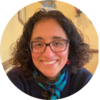 Presenter’s information: Iman Bakour-Aziz is a lead instructor of Arabic MSA and Levantine dialect at LARC. She holds a degree in Science, a project management certificate, leadership certificate, diplomas in Spanish language, and is a lead instructor with experience in teaching Arabic language and culture, in addition to reaching out and providing support to the language instructors. Also, she coordinates other language projects under DIAGORA. She has experience in outreaching, connecting with and mobilizing different community groups, which was the fruit of multiple years working with national and local NGOs as an outreach project manager, as a volunteer, and as a board member in a couple of organizations.
Presenter’s information: Iman Bakour-Aziz is a lead instructor of Arabic MSA and Levantine dialect at LARC. She holds a degree in Science, a project management certificate, leadership certificate, diplomas in Spanish language, and is a lead instructor with experience in teaching Arabic language and culture, in addition to reaching out and providing support to the language instructors. Also, she coordinates other language projects under DIAGORA. She has experience in outreaching, connecting with and mobilizing different community groups, which was the fruit of multiple years working with national and local NGOs as an outreach project manager, as a volunteer, and as a board member in a couple of organizations.
2:30 pm to 3:30 pm - Ghadah
Abstract:
This presentation will be conducted in Arabic language. It outlines key strategies for effective assessment and evaluation in education. It emphasizes diverse assessment techniques, such as formative and summative assessments, to improve student learning. Topics include the importance of timely feedback, using technology for efficient evaluation, and clear rubrics for grading. It also highlights accommodating different learning styles through various assessment methods and encouraging student involvement for self-assessment and growth. The aim is to provide educators with the necessary tools to make informed decisions and support ongoing improvement in teaching and learning.
By the end of this workshop, participants will be able to:
- Utilize formative and summative assessment methods.
- Provide timely, constructive feedback.
- Integrate educational technologies.
- Apply clear rubrics.
- Employ various assessment types.
- Involve students in self-assessment.
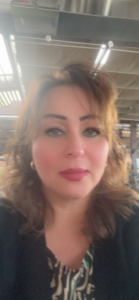 Presenter’s information: Ghadah Al Saadi is an Arabic language educator with over fifteen years of experience in the U.S., specializing in Modern Standard Arabic and the Iraqi dialect. She leads, coordinates, and develops language programs at the Language Acquisition Resource Center at San Diego State University and teaches at Cuyamaca College. Ghadah holds a master’s degree in Arabic Language and Linguistics from the California University of Pennsylvania and adopts a flexible teaching philosophy tailored to students' diverse needs, utilizing various methods to promote effective learning.
Presenter’s information: Ghadah Al Saadi is an Arabic language educator with over fifteen years of experience in the U.S., specializing in Modern Standard Arabic and the Iraqi dialect. She leads, coordinates, and develops language programs at the Language Acquisition Resource Center at San Diego State University and teaches at Cuyamaca College. Ghadah holds a master’s degree in Arabic Language and Linguistics from the California University of Pennsylvania and adopts a flexible teaching philosophy tailored to students' diverse needs, utilizing various methods to promote effective learning.
Certified as an ACTFL ILR OPI tester and quality assurance reviewer for Arabic in MSA, Iraqi, and Levantine dialects, her expertise extends beyond teaching. Ghadah also enjoys cooking traditional Arabic food and shopping, showcasing her cultural connection. Her dedication to teaching and adaptable methods significantly enhance students' Arabic proficiency and communication skills.
Strand A: Foundational Level
- Dates: January 27, February 24, March 23, April 27, and May 18 2024
- Time: From 8:30 am to 3:00 pm
- Format: Hyflex (in person and on Zoom)
- Location for in person: SDSU-LARC
- Presenter: Dr. Cecile Nedellec
Description: Participants will learn, review, and practice teaching strategies linked to the three modes of communication: presentational, interpersonal, and interpretive. Participants will receive support in developing lesson plans incorporating the new California World Language Standards and the reviewed/learned strategies. Participants will be able to implement those lesson plans into their own instructional environment.
Contact Information
Shahnaz Ahmadeian Fard
Director, SAILN Project
Email: larc.sailn@sdsu.edu
Office Phone: (619) 594-0846





